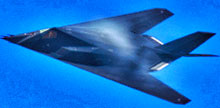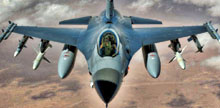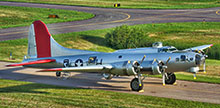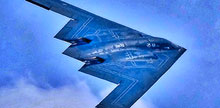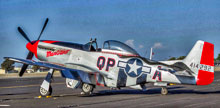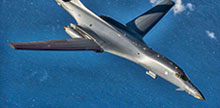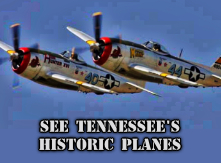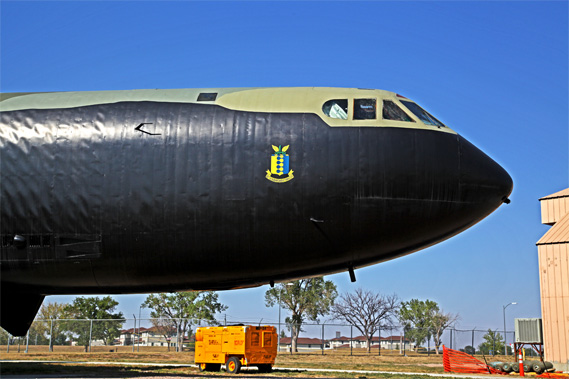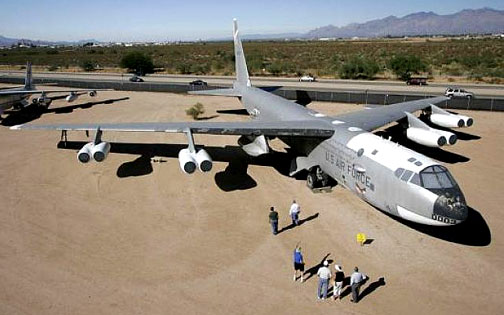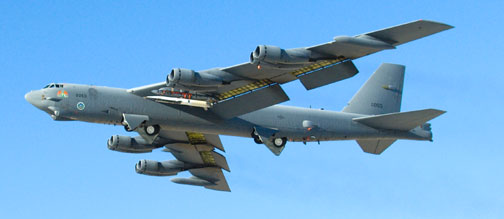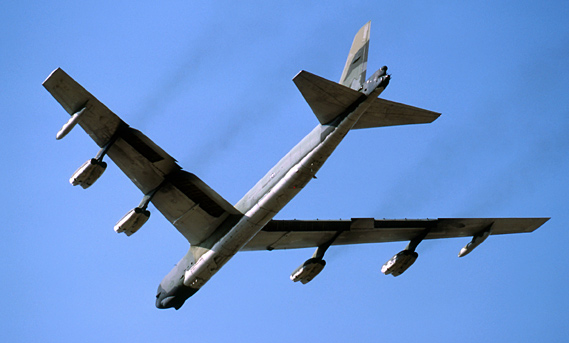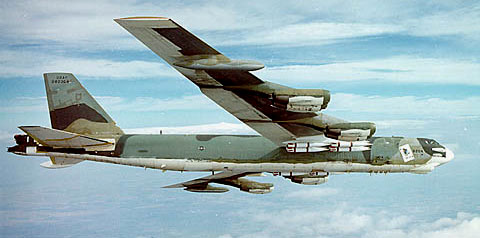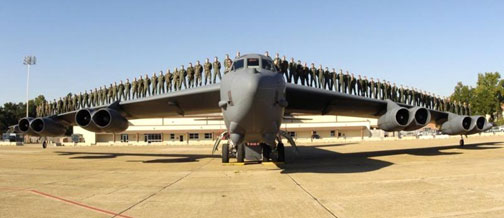B-52 Stratofortress
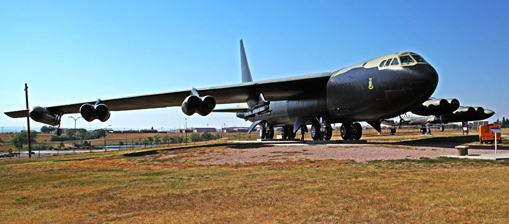
Air Combat Command’s B-52 is a long-range, heavy bomber that can perform a variety of missions. The bomber is capable of flying at high subsonic speeds at altitudes up to 50,000 feet (15,166.6 meters). It can carry nuclear or conventional ordnance with worldwide precision navigation capability.
Mission
Air Combat Command’s B-52 is a long-range, heavy bomber that can perform a variety of missions. The bomber is capable of flying at high subsonic speeds at altitudes up to 50,000 feet (15,166.6 meters). It can carry nuclear or conventional ordnance with worldwide precision navigation capability.
Features
In a conventional conflict, the B-52 can perform air interdiction, offensive counter-air and maritime operations. During Desert Storm, B-52s delivered 40 percent of all the weapons dropped by coalition forces. It is highly effective when used for ocean surveillance, and can assist the U.S. Navy in anti-ship and mine-laying operations. Two B-52s, in two hours, can monitor 140,000 square miles (364,000 square kilometers) of ocean surface.
All B-52s are equipped with an electro-optical viewing system that uses platinum silicide forward-looking infrared and high resolution low-light-level television sensors to augment the targeting, battle assessment, flight safety and terrain-avoidance system, thus further improving its combat ability and low-level flight capability.
Pilots wear night vision goggles (NVGs) to enhance their night visual, low-level terrain-following operations. Night vision goggles provide greater safety during night operations by increasing the pilot’s ability to visually clear terrain and avoid enemy radar.
Starting in 1989, an on-going modification incorporates the global positioning system, heavy stores adaptor beams for carrying 2,000 pound munitions and additional smart weapons capability. All aircraft are being modified to carry the AGM-142 Raptor missile and AGM-84 Harpoon anti-ship missile.
The use of aerial refueling gives the B-52 a range limited only by crew endurance. It has an unrefueled combat range in excess of 8,800 miles (14,080 kilometers).
The aircraft’s flexibility was evident during the Vietnam War and, again, in Operation Desert Storm. B-52s struck wide-area troop concentrations, fixed installations and bunkers, and decimated the morale of Iraq’s Republican Guard. The Gulf War involved the longest strike mission in the history of aerial warfare when B-52s took off from Barksdale Air Force Base, La., launched conventional air launched cruise missiles and returned to Barksdale– a 35-hour, non-stop combat mission.
Background
For more than 35 years B-52 Stratofortresses have been the primary manned strategic bomber force for the United States. The B-52 is capable of dropping or launching a significant array of weapons in the U.S. inventory. This includes gravity bombs, cluster bombs and precision guided missiles. Updated with modern technology, the B-52 will continue into the 21st century as an important element of our nation’s defenses. Current engineering analysis show the B-52’s life span to extend beyond the year 2045.
The B-52A first flew in 1954, and the B model entered service in 1955. A total of 744 B-52s were built with the last, a B-52H, delivered in October 1962. Only the H model is still in the Air Force inventory and all are assigned to Air Combat Command.
The first of 102 B-52H’s was delivered to Strategic Air Command in May 1961. The H model can carry up to 20 air launched cruise missiles. In addition, it can carry the conventional cruise missile which was launched from B-52G models during Desert Storm.
The B-52’s electronic countermeasures suite is capable of protecting itself against a full range of air defense threat systems by using a combination of electronic detection, jamming and infrared countermeasures. The B-52 can also detect and counter missiles engaging the aircraft from the rear. These systems are undergoing continuous improvement in order to enable them to continue to counter emerging threat systems.
General Characteristics
Primary Function: Heavy bomber
Contractor: Boeing Military Airplane Co.
Power Plant: Eight Pratt & Whitney engines TF33-P-3/103 turbofan
Thrust: Each engine up to 17,000 pounds (7,650 kilograms)
Length: 159 feet, 4 inches (48.5 meters)
Height: 40 feet, 8 inches (12.4 meters)
Wingspan: 185 feet (56.4 meters)
Speed: 650 miles per hour (Mach 0.86)
Ceiling: 50,000 feet (15,151.5 meters)
Weight: Approximately 185,000 pounds empty (83,250 kilograms)
Maximum Takeoff Weight: 488,000 pounds (219,600 kilograms)
Range: Unrefueled 8,800 miles (7,652 nautical miles)
Armament: Approximately 70,000 pounds (31,500 kilograms) mixed ordnance bombs, mines and missiles. (Modified to carry air-launched cruise missiles, Harpoon anti-ship and Have Nap missiles.)
Crew: Six (aircraft commander, pilot, radar navigator, navigator,electronic warfare officer, and Defensive Fire Control Systems Operator Position – the Gunner, who is the only enlisted crew member.)
Accommodations: Six ejection seats
Unit Cost: $30 million
Date Deployed: February 1955
Inventory: Active force, 85; ANG, 0; Reserve, 9

